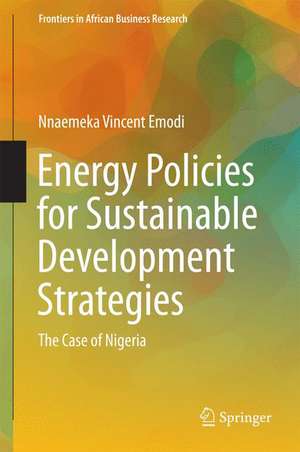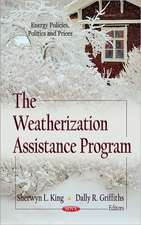Energy Policies for Sustainable Development Strategies: The Case of Nigeria: Frontiers in African Business Research
Autor Nnaemeka Vincent Emodien Limba Engleză Hardback – 26 mai 2016
In this book, a number of long-term energy scenarios are developed for Nigeria considering the impact of vital factors that may influence energy policies in the country’s future energy system. The energy scenarios were developed through the Long-Range Energy Alternatives Planning System (LEAP) model. The model identified the future energy demand and supply pattern using a least-cost combination of technology options while limiting the emission of greenhouse gases. The book presents four scenarios, and key parameters considered include GDP, households, population, urbanization and the growth rates of energy-intensive sectors. Further, it highlights the findings of the cost-benefit analysis, which reveal the costs of implementing selected policies and strategies in Nigeria, including those focusing on energy efficiency and fuel/technology switching. The book also discusses the application of the LEAP-OSeMOSYS Model in orderto identify lowest-cost power plants for electricity generation. Some sustainable strategies that can ensure a low carbon development in Nigeria are also explored on the basis of successful country cases in relation to the Nigerian LEAP model. As such, the book will help policy makers devise energy and sustainable strategies to achieve low carbon development in Nigeria.
| Toate formatele și edițiile | Preț | Express |
|---|---|---|
| Paperback (1) | 639.73 lei 6-8 săpt. | |
| Springer Nature Singapore – 30 mai 2018 | 639.73 lei 6-8 săpt. | |
| Hardback (1) | 646.11 lei 6-8 săpt. | |
| Springer Nature Singapore – 26 mai 2016 | 646.11 lei 6-8 săpt. |
Preț: 646.11 lei
Preț vechi: 760.13 lei
-15% Nou
Puncte Express: 969
Preț estimativ în valută:
123.65€ • 134.26$ • 103.86£
123.65€ • 134.26$ • 103.86£
Carte tipărită la comandă
Livrare economică 22 aprilie-06 mai
Preluare comenzi: 021 569.72.76
Specificații
ISBN-13: 9789811009730
ISBN-10: 9811009732
Pagini: 354
Ilustrații: XVII, 265 p. 85 illus.
Dimensiuni: 155 x 235 x 18 mm
Greutate: 0.58 kg
Ediția:1st ed. 2016
Editura: Springer Nature Singapore
Colecția Springer
Seria Frontiers in African Business Research
Locul publicării:Singapore, Singapore
ISBN-10: 9811009732
Pagini: 354
Ilustrații: XVII, 265 p. 85 illus.
Dimensiuni: 155 x 235 x 18 mm
Greutate: 0.58 kg
Ediția:1st ed. 2016
Editura: Springer Nature Singapore
Colecția Springer
Seria Frontiers in African Business Research
Locul publicării:Singapore, Singapore
Cuprins
Chapter 1: Overview.- Chapter 2: The Energy Sector in Nigeria.- Chapter 3: Literature Review.- Chapter 4: Methodology, Data and Scenario Development.- Chapter 5: Results and Discussions.- Chapter 6: Conclusion and Policy Recommendation.- References.
Notă biografică
Nnaemeka Vincent Emodi is an Energy Analyst with a Bachelor of Science degree in Chemistry from Michael Okpara University of Agriculture, Umudike, Nigeria. He completed his Master Degree in Engineering from the Department of Technology Management Economics and Policy Program at Seoul National University, Republic of Korea. He is currently a Doctorate degree (Ph.D.) student in Economics at the College of Business, Law, and Governance in James Cook University, Cairns, Australia. He is an author and co-author of some articles and reviews. His current research interest includes climate change, energy modeling, energy economics and policy, sustainable development, technology and commercialization, renewable energy application and low carbon technology in the context of developing countries.
Textul de pe ultima copertă
In this book, a number of long-term energy scenarios are developed for Nigeria considering the impact of vital factors that may influence energy policies in the country’s future energy system. The energy scenarios were developed through the Long-Range Energy Alternatives Planning System (LEAP) model. The model identified the future energy demand and supply pattern using a least-cost combination of technology options while limiting the emission of greenhouse gases. The book presents four scenarios, and key parameters considered include GDP, households, population, urbanization and the growth rates of energy-intensive sectors. Further, it highlights the findings of the cost-benefit analysis, which reveal the costs of implementing selected policies and strategies in Nigeria, including those focusing on energy efficiency and fuel/technology switching. The book also discusses the application of the LEAP-OSeMOSYS Model in order to identify lowest-cost power plants for electricity generation. Some sustainable strategies that can ensure a low carbon development in Nigeria are also explored on the basis of successful country cases in relation to the Nigerian LEAP model. As such, the book will help policy makers devise energy and sustainable strategies to achieve low carbon development in Nigeria.
Caracteristici
Presents a well-defined bottom-up energy model for the Nigerian energy system Explores the influences of energy policies and strategies on the future energy services in Nigeria Presents a cost-benefit analysis, least-cost electricity generation options and low carbon strategies for Nigeria Includes supplementary material: sn.pub/extras
























